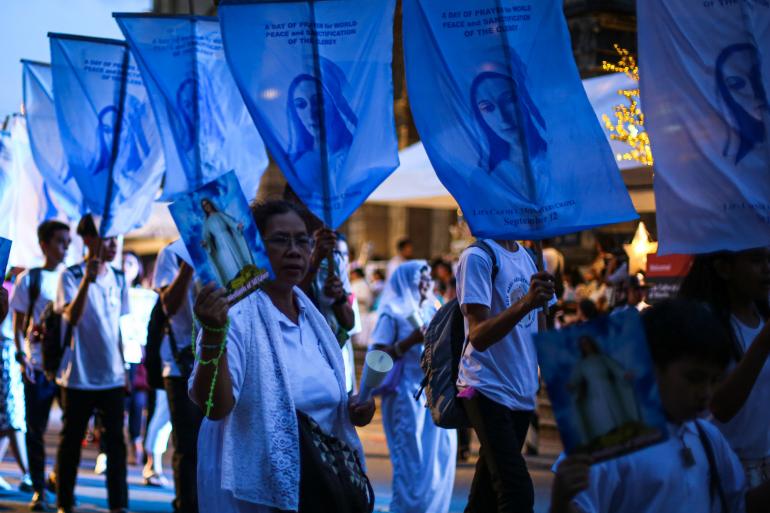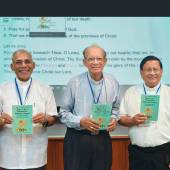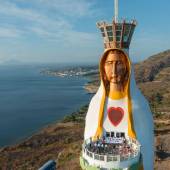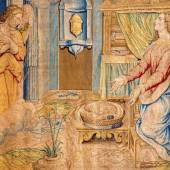The Feast of Our Lady of Assumption: Mary’s search for the vaccine of justice

Cardinal Charles Maung Bo of Yangon
Dear Brothers and Sisters in Christ,
Happy Feast of Assumption.
Today we gather to celebrate the greatness of our Lady.
Mary the maiden from Nazareth was raised to the pinnacle of glory today. The human family joins her in her blessings. She is celebrated by the great English poet as “our tainted nature’s solitary boast.”
“Woman! above all women glorified,
Our tainted nature's solitary boast;
Purer than foam on central ocean tost;
Brighter than eastern skies at daybreak strewn”- The Virgin
At the end of her earthly life, she was assumed body and soul into heaven. It was indeed fitting that no decay would touch her body because she had given birth to Jesus — the Lord of Yesterday, today and tomorrow — and also because she was sinless. She was immaculately conceived and remained sinless throughout her life. Death is the result of sin as Scripture tells us (Rom 6:23) so therefore she was assumed body and soul to heaven at the end of her earthly life.
One of the titles we give to our Lady is Ark of the Covenant and our first reading opens with John’s vision of heaven in which he sees something which would startle his contemporaries — he sees the Ark of the Covenant and he sees:
“A woman clothed with the sun, with the moon under her feet, and on her head a crown of twelve stars…” (Rev 12:1)
The woman in John’s vision was pregnant and giving birth to a male child and at the same time a dragon was waiting to harm the child but both the mother and child were spared by divine intervention.
We can understand this vision of John as Israel in the Old Testament giving birth to the Church in the New Testament and the dragon is the evil forces trying destroy the Church.
This feast comes amidst the ravages of a pandemic. The pandemic is the dragon waiting to destroy lives. We stretch our hands to Our Mother today to save us.
As the COVID started its menacing dance of death, Pope Francis offered the human family to the protection of Our Mother. Let our Mother whose body was taken without any damage totally to heaven, intercede with the Living God, to protect all of us.
We are glad that as Catholics we have a Mother who intercedes for us. We pity those non-Catholic Christians who chose to devalue Mary, who was extolled by Elizabeth as “mother of My Saviour.”
This feast reminds the world the role played by the woman in salvation. The Bible shows God works wonders through women: the power of God is expressed through women, very special women, women who were neglected or ridiculed by the society, like old Sara who could not have a son or Hannah. God intervenes in their life to continue the liberation of Israel.
In the life of the Virgin Mary, God intervenes to bring the Savior to the world. Mary is an integral part of Salvation history. Denying Mary is denying the Bible, denying Mary is denying the mission of Jesus. Rejecting Mary is the rejection of the central message of the Bible. It is rejecting the message of Yahweh who told the shepherd Moses: “I heard the cry of my suffering people, the slaves of Egypt.”
Today’s Gospel tells us the great mission proclamation by Mary through her Magnificat. Today’s feast reminds us of those who struggle for the salvation of the world “never die” but become part of God’s family. Mary lives today. When Jesus offered Mary to John as “Behold your mother,” he offered to humanity his salvific work that continues today.
The Bible is a glorious story of God as Justice, God who takes sides with the suffering people, the God who hears the cry of his people (Exodus 3).
This God will establish his Kingdom through the lives of two sterile women in the Old Testament: Sarah and Hannah.
After four centuries of spiritual darkness and moral decadence that had left the social fabric of Israel torn to shreds, Israel had become a nation in desperate need of change. The surprising instrument of change was Hannah, whose barrenness was symbolic of the nation’s spiritual state.
The song of Hannah resembles Mary’s Magnificat.
The Lord makes poor and makes rich; He brings low and lifts. He raises the poor from the dust and lifts the beggar from the ash heap, to set them among princes and make them inherit the throne of glory. (1 Samuel 2 : 1-10)
Mary’s Magnificat sounds like the Magna Carta of human liberation.
He has put down the mighty from their thrones and exalted the lowly. He has filled the hungry with good things, and the rich He has sent away empty. (Luke 1: 46-55)
Two women, two different contexts. Hannah of old testament was old and sterile, Mary was a virgin and pure. God chose these “lowly” to be vessels of salvation. And both understood the mission well. Because they did God’s mission, both could say “My Soul Glorifies the Lord.”
That is the reason they found favor with God. Mary who was instrumental in the incarnation of her Son Jesus has been a co-redemptrix, and participated in the salvific mission of Jesus Christ. Because of her participation not only in the “flesh of Jesus” but also in the “mission of Jesus,” she became holy, worthy to be of immaculate conception and of assumption into heaven.
We need to understand this feast today in that sense. We need to understand Mary and her Mission well.
Mary, in our tradition, was a vehicle for Jesus: a holy womb, a good and compliant and obedient girl. But when we read the Magnificat we are shocked to discover that Mary wasn’t quiet, nor was she what we would call meek and mild. Her language was fiery and non-compromising.
She looks like a revolutionary with a blazing fire of zeal for God’s justice.
Throughout history, we would learn, poor and oppressed people had often identified with this song — the longest set of words spoken by a woman in the New Testament (and a poor, young, Jewish woman!)
Dietrich Bonhoeffer, a German pastor and theologian who was executed by the Nazis, called the Magnificat “the most passionate, the wildest, one might even say the most revolutionary hymn ever sung.”
Some countries — such as India, Guatemala, and Argentina — have outright banned the Magnificat from being recited in liturgy or public.
And evangelicals — in particular, white evangelicals — have devalued the role of Mary, and her song, to the point that she has almost been forgotten as anything other than a silent figure in a nativity scene.
The song of Mary is the oldest Advent hymn. It is at once the most passionate, the wildest, one might even say the most revolutionary Advent hymn ever sung. This is not the gentle, tender, dreamy Mary whom we sometimes see in paintings.
Most of the non-Catholic Christians, especially those from rich countries, the evangelical, the prosperity Gospel Pharisees, have a hidden agenda of blunting the message of hope to the poor by relegating Mary’s role in redemption.
Window shopping Pentecostals, cherry-picking biblical words to sustain their vulgar display of wealth have hidden Mary, abused her and buried her revolutionary song of the Magnificat.
The song doesn’t sound like good news if you are well-fed, or rich, or in a position of power and might — or if you benefit from systems that oppression. Mary becomes a thorn in the flesh of many rich Christians, who blissfully forget the poor and part of systems that commit economic and environmental injustice.
How can they accept Mary? When they preach their Gospel flying across in the custom-made private planes, their heart will sink if they hear her words:
He has put down the mighty from their thrones and exalted the lowly. He has filled the hungry with good things, and the rich He has sent away empty. (Luke 1: 46-55)
Which her son Jesus would castigate later saying:
It is easier for a camel to go through the eye of a needle than for a rich person to enter the Kingdom of God!” (Mt: 19:24).
Mary was a prophetess in the mode of Isiah, Amos and other great prophets who castigated the powerful and the privileges who forgot the poor of Yahweh. Like the prophets, she would seek justice, ask for justice and righteousness to flow like a river.
Her Magnificat would be articulated later by her son in his Galilean manifesto:
The Spirit of the Lord is on me,
because he has anointed me
to proclaim good news to the poor.
He has sent me to proclaim freedom for the prisoners
and recovery of sight for the blind,
to set the oppressed free,
to proclaim the year of the Lord’s favor (Lk 4: 18-19)
Theologian Warren Carter writes that in the time of Jesus, 2 to 3 per cent of the population was rich, while the majority lived a subsistence-level existence.
Mary was born into an unjust structure. She was poor. When she was pregnant, Rome wished to test their citizen. Made her walk nearly 70 Kms, as some of the arrogant government made the migrants walk thousands of kilometers. Mary echoes the dream of God, a world without want, where everybody can pray “Our Father who art in heaven.” Christ did not come to take people to heaven only. He came so that “Thy Kingdom Come, thy will be done on earth as it is done in heaven.”
A heaven on earth. That was the dream of Mary. The dream of the Bible. A world of justice. Those who domesticated the Bible, smothered its defiant fiery rage against injustice and subjugation, have manipulated to bury Mary in their miserable grave of amnesia. It is akin to the efforts to hide the sun with the palm of our hands. Failure is destiny. The economic and political worldview of many non-Catholic Christians has led to a silencing of Mary and God’s dream for the world.
Very often a prayer said: “Blessed is the womb of Jesus.” Yes she is the Ark of the Covenant but she was NOT only the womb of Jesus, but she was also the VOICE of Jesus. The Voice that articulated his Mission. The fist that rose against the Roman occupation and the looting of Israel by the cronies, that left nearly 97 percent of its people in utter poverty.
The coronavirus pandemic has exposed injustices in the world. We pray to Mary to protect us from the pandemic. But the pope has pointed out poor people have been inflicted with another virus: the pandemic of hunger, the pandemic of abuse, the pandemic of no human dignity.
Nearly 122 million people have lost their livelihoods and hunger stares at their face. Another month of Covid and the death rates due to hunger pandemic will overtake the death toll due to the virus.
This world that was blessed and was given to our first parents has become the looting ground for the rich and powerful. One percent of the rich control more than 60 percent of the wealth and the small percentage of people are looting the natural resources.
And now the greatest threat comes from authoritarian leaders. Unjust rulers. Injustice is the biggest virus that will see millions dying during this pandemic.
And what is the vaccine?
It is already invented in the Bible: Justice. God as Justice. This is what the humble virgin from Nazareth would proclaim in her encounter with Elizabeth, the mother of the prophet John the Baptist.
Assumption day is the day our Lady is calling us to read the Bible to understand God as God who takes side with the poor and the oppressed. Those who see God in the liberation of human suffering are already creating heaven on earth. Let us pray to Mary our mother to give us the courage to see the assumption in our lifetime.
This is the homily of Cardinal Charles Maung Bo, archbishop of Yangon in Myanmar, for the Feast of the Assumption on August 16, 2020.
Radio Veritas Asia (RVA), a media platform of the Catholic Church, aims to share Christ. RVA started in 1969 as a continental Catholic radio station to serve Asian countries in their respective local language, thus earning the tag “the Voice of Asian Christianity.” Responding to the emerging context, RVA embraced media platforms to connect with the global Asian audience via its 21 language websites and various social media platforms.














